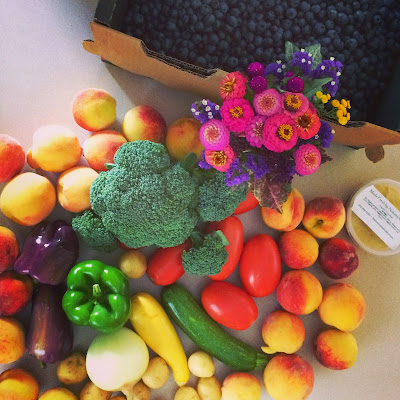It's important to eat foods in their season. Seasonal eating ensures the freshest produce as well as providing the highest nutrition value.
Photo: 2014, Kathy Fannon
Farmers markets are starting this week in my area and I encourage you to go to one. May to November is the best time of year for eating local and eliminates excuses for not eating healthy!
9 benefits of seasonal eating, especially from your local farmer:
1. Freshness
Food that is picked the day before it's brought to the farmers market will be fresher than produce found at the grocery store that was in transit for days.
Every time I walk through the produce department at my grocery store I wrinkle my nose at how it all looks. Wilted, spotted, squishy and even moldy! I have to dig to find the best possible item.
2. Nutrition
When a plant has a longer period of time to soak up the sun your produce will have higher levels of vitamins, minerals and antioxidants because it has a chance to ripen before picked. Hey, if you're going to eat Brussels sprouts or kale, you may as well get the highest nutrition bang for your buck!
3. Flavor
Tomatoes fresh from the garden or farmers market in the summer are full of flavor! How about a tomato in the winter from the grocery store? There's no flavor; it’s bland and mushy. Produce has more flavor when eaten in season because it’s picked when ripe.
4. Variety
I know from my own past experience, the typical American diet consists of much the same thing all year. Long ago I noticed the Standard American Diet (S.A.D.) is mostly beige - fried foods, pizza, corn dogs, french fries/potato chips, bread, pasta, cereal, etc.
Eating food in its season brings a wide variety of color to your table from the many fruits and vegetables. Even if you tend to eat a S.A.D. menu, incorporate some seasonal produce into your meal for added color and nutrition.
"If you eat with the seasons rather than eating the same 15 things all year round, the variety will mean you end up with a greater range of nutrients in the body. You get a completely changeable diet that is so much more beneficial than sticking to the same things again and again.” Maria Griffiths, spokesperson for the Institute for Optimum Nutrition.
5. Forces You To Try New Things
When using strictly in-season foods, it forces you to try new things. There are so many websites for recipe ideas that you'll never have to wonder what to do with a fresh beet, stalk of Brussels sprouts or bunch of parsnips.
If you're feeling particularly brave, look into a CSA (community supported agriculture). Many farmers provide a weekly box of produce for you that will be loaded with a variety of items. Each week will have different seasonal foods for you to try and expand your taste buds!
6. Provide Nutrients You Need in a Particular Season
Have you ever wondered why fruits and vegetables grow seasonally? Why don't we have watermelon and pumpkins all year?
God has created a variety of produce with different nutritional values for different seasons. Leafy greens are great in the spring because they help cleanse your blood and liver from a winter of eating heavier foods. Likewise, root vegetables are loaded with minerals and vitamins to warm our bodies to get us through a dark, cold winter.
[Note: This is a big topic on its own. Dr. John Douillard (due-yard) has written a great book, The 3-Season Diet. Highly recommend!]
7. It's Normal
It's normal to eat foods in their season. Have you ever noticed how we eat certain foods at different times of the year? Who makes soup in the summer?
Seasonal eating gives our body what it needs at different times of the year. It isn't normal to eat cooling fruit in the winter, and neither is eating warming steel-cut oats with apples and pumpkin in the summer.
Eating what's normal will help cut cravings for sugar and carbs, will help you eat when you're really hungry (not just bored, tired or sad) and will help you stay healthy in the months that follow. (Did you know eating greens in the spring sets you up to stay healthy in the coming winter?)
8. Eat Whole Foods
Eating seasonal means you're paying attention to the fruits and vegetables that are available, which is helping you eat a whole foods diet. Click here to read my article about whole foods.
9. Supports Local Farmers
When you eat seasonal and local you get to know who grows your food and build relationship with them. You can ask questions about the growing process, whether or not it’s organic and find out the farmer's favorite way to cook what they grow, gaining new recipes.
I have a few favorite farmers at the Holland Farmers Market. I know about their children and grandchildren, and they know about mine. I know the children of another favorite farmer because his kids work for him. It's fun to watch them grow and mature from year to year and I count them all as friends. I love the sense of community I have with them!
Not sure what's in season in your area?
The farmers market is always the best place to start, but if there isn't one available check out Sustainable Table to find what's in season near you.
Feeling inspired to find some local, seasonal food? What are you anxious to try first? Leave a comment below.
Read my previous post: Is Sucralose Good For You

